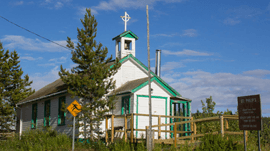‘Locally-raised clergy’ is a familiar term in Council of the North dioceses—and nobody knows this better than The Rev. Sarah Usher. Sarah is a non-stipendiary Deacon in the Diocese of the Yukon. In addition to her roles as Diocesan Administrative Officer and as a member of the ministry team at Whitehorse’s Church of the Northern Apostles, she also serves part-time as a Minister of Presence at the parish of St. Philip’s in Teslin. One Sunday a month she makes the two-hour trip on the Alaska highway from Whitehorse to Teslin to serve the needs of her small but dedicated congregation.

Located on Teslin Lake, at the mouth of the Yukon’s Nisutlin Bay, the village of Teslin is a community of about 450 people. Teslin was originally used as a summer camp or meeting area for the Tlingit First Nation. Now there is a mix of cultures, but it is still primarily a community of the Teslin Tlingit people. Following the 1898 gold rush, Teslin grew into a more permanent community with the establishment of an Anglican mission in 1906. After more than a century of proclaiming the Gospel, that Anglican presence boldly continues through ministry to this small community by one of its own.
Sarah’s current ministry in Teslin has deep roots in her own family history in the community. Her father was the Anglican minister there, she was married at St. Philip’s to her husband Len, who was also born and raised in Teslin and is a member of the Teslin Tlingit Council, and the first of her four children was baptised at St. Philip’s. The couple recently inherited Len’s childhood home in Teslin, further strengthening their bond with the town. “When you raise people up from a community, the difference is that, as a minister, you are a part of it,” she says.
Up until 10 years ago, the diocese could still afford to pay a clergyperson for her position, but as the economy has declined in the Yukon (in 2013 mineral exploration spending was the lowest it had been in years) the diocese has been faced with shrinking financial resources. “We just don’t have the money to pay for someone there,” says Sarah. A previous attempt at a part-time paid position didn’t work. “It was very difficult in a community that size to find a half-time job and then do ministry half-time–because ministry is never half-time. It’s a tough balance,“ she says.
Sarah says people from churches in larger urban centres have implied “Why bother?” when it comes to keeping a church open for only a handful of parishioners. “They look at you like ‘What do you mean you went to church and there were six people in the congregation?’” But for her, closing St. Philip’s is not an option. “We have really found with our Ministry of Presence position that you have to have to have something. Because if you don’t it just dies,” she says. “Those six people need us and are very, very appreciative. You can’t say no.”
Surprisingly, even those in the community who are not regular churchgoers value her ministry at St. Philip’s. She recalls a recent event during a weekend stay at their cabin on the Nisutlin River. Some friends from her high school days in Teslin dropped by and as they were leaving, a man whose mother attends the parish said, “I just want you to know that when you are up there in your robes, what you speak is coming from your heart and it’s the truth, and I appreciate that.” Sarah says she “nearly fell over” to hear this from “someone who rarely darkens the door of the Church.” She continues, “It showed me that it was important even to those who are not coming–they still want the reassurance that the church is there for them.”
When Sarah’s husband retires in two years, she expects they will move back to Teslin, which will give her the ability to minister full-time to her congregation. She looks forward to it, saying, “There is something special about going home and having known these people most of my life.”
Mark Hauser
Council of the North Communications
Interested in keeping up-to-date on news, opinion, events and resources from the Anglican Church of Canada? Sign up for our email alerts .
